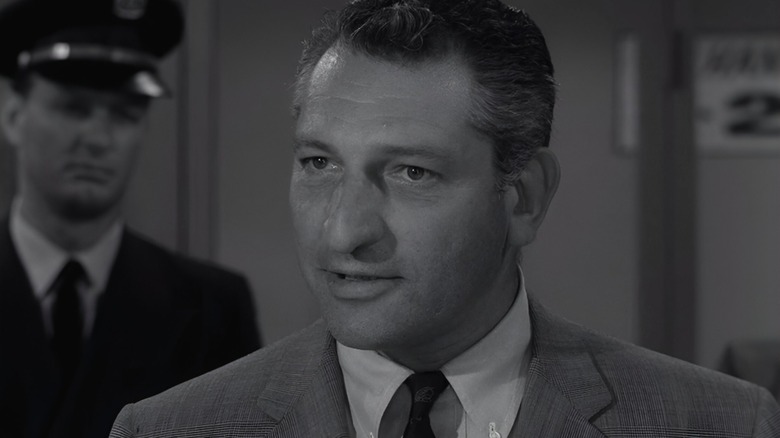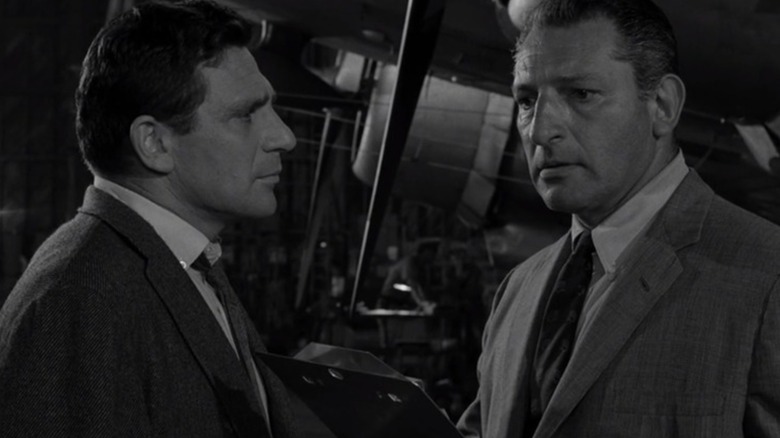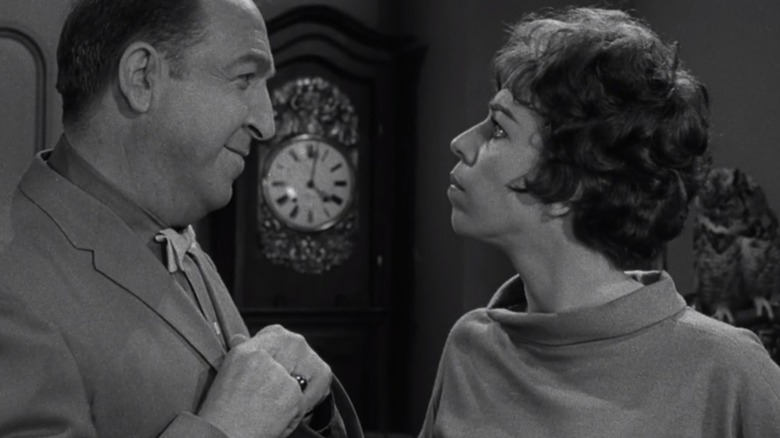The Twilight Zone Episode That Signaled The Beginning Of The Series' End
We may receive a commission on purchases made from links.
"The Arrival," the second episode of the third season of "The Twilight Zone" (as was written by series creator Rod Serling himself), poses an unusual problem. The narrative starts with Flight 107, which is classified as a propeller-driven Douglas DC-3, landing with no crew or passengers. This prompts the aviation department to appoint Grant Sheckly (Harold J. Stone) to investigate this curious case. Although Sheckly brings his A-game to the investigation and feels like he's close to the truth, the puzzle adamantly remains unsolved despite his involvement (along with other talented individuals). That is, anyway, until a breakthrough occurs, forcing Sheckly to question the very nature of his reality.
While this might sound like your typical unsettling "Twilight Zone" episode, the negative reactions to "The Arrival" marked the beginning of the end for Serling's acclaimed series. What might seem like a one-off misfire was actually a glaring symptom of creative fatigue, as the showrunner admitted in a 1961 interview. According to Marc Scott Zicree's "The Twilight Zone Companion," Serling felt "drained of ideas," having already written so many compelling and spectacular scripts for the show. As Serling put it:
"I've never felt quite so drained of ideas as I do at this moment. Stories used to bubble out of me so fast I couldn't set them down on paper quick enough — but in the last two years, I've written 47 of the 68 'Twilight Zone' scripts, and I've done 13 of the first 26 for next season. I've written so much I'm woozy [...] You can't retain quality. You start borrowing from yourself, making your own cliches."
Serling's refreshingly honest assessment of the situation explains a lot about "The Arrival." Its ending, in particular, feels like a letdown after so much captivating build-up, and it's full of plot holes, too.
The criticisms of The Arrival spelled doom for The Twilight Zone at large
"The Arrival" inches towards its climactic twist as the investigators realize that each one of them, Sheckly included, perceive the plane's seat colors and registration numbers differently. Concluding that the plane is not real, Sheckly tests this hypothesis by sticking his arm in its propeller. When that fails to harm him, the plane's staff promptly disappears, as does the actual plane. Unsettled, Sheckly realizes that the Flight 107 case is really a hallucination triggered by his repressed emotions about a previously unsolved case in his otherwise impressive career. This setup could've been the perfect vehicle (no pun intended) to explore Sheckly's repressed ambitions, but the episode's conclusion feels like a cop-out, as it resorts to the hackneyed "it was all a fantasy" trope.
According to Zicree's book, Variety's review of "The Arrival" called out the inconsistencies in the episode and expressed concern regarding the longevity of "The Twilight Zone" itself:
"The show now seems to be feeding off itself. Last Friday's episode, unless it proves to be an exception in the new skein, doesn't augur well for the future of the series. 'Twilight Zone' seems to be running dry of inspiration."
While this proclamation might sound harsh, "The Arrival" is disappointing for reasons that go beyond its underwhelming payoff. Think about it: if Sheckly merely hallucinated Flight 107, how does that explain the sequence where he's seen piloting the plane 20 feet above ground? And even if we accept that these events took place purely in his mind, Sheckly's obsession with a decades-old unsolved puzzle isn't fleshed out enough for us to feel the impact of this revelation. The seeds of a competent "Twilight Zone" episode are sown, but they never bloom into something novel or meaningful.
Why The Twilight Zone only continued to struggle after The Arrival
Looking at "The Twilight Zone" season 3 as a whole, it definitely has some bangers, including the brilliant "To Serve Man" and the disorienting "Five Characters in Search of an Exit." There's also the catharsis-inducing "Deaths-Head Revisited," wherein a Nazi officer visits Dachau for leisure, only to be hounded by the spirits of those he tormented. Unfortunately, the visceral immediacy of that episode is undercut by the likes of "Hocus-Pocus and Frisby" and (the atrocious) "Cavender is Coming," which are mind-numbingly mediocre in a way you wouldn't expect "The Twilight Zone" to be. Overall, season 3 has perhaps a dozen forgettable episodes, making it a drastic dip in quality for the show at large.
Of course, Serling's struggles on "The Twilight Zone" are understandable. After all, it's a tall order, having to constantly measure up to a standard set by our past selves. In Serling's case, fatigue had set in, and the show's other creatives failed to salvage the situation. According to Zicree's book, Serling accepted a teaching position at Antioch College at this point, even after the series was renewed. He explained his reasoning accordingly:
"First is extreme fatigue. Secondly, I'm desperate for a change of scene, and third is a chance to exhale, with the opportunity for picking up a little knowledge instead of trying to spew it out. At the moment, my perspective is shot. I think that is evidence at times in the lack of quality in some of the 'Twilight Zone' scripts. And frankly, I'd like to be able to do my best work all the time."
Fortunately, while the magic of "The Twilight Zone" started to fade at this juncture, its finest stories of the esoteric and unknown still retain their power today.


